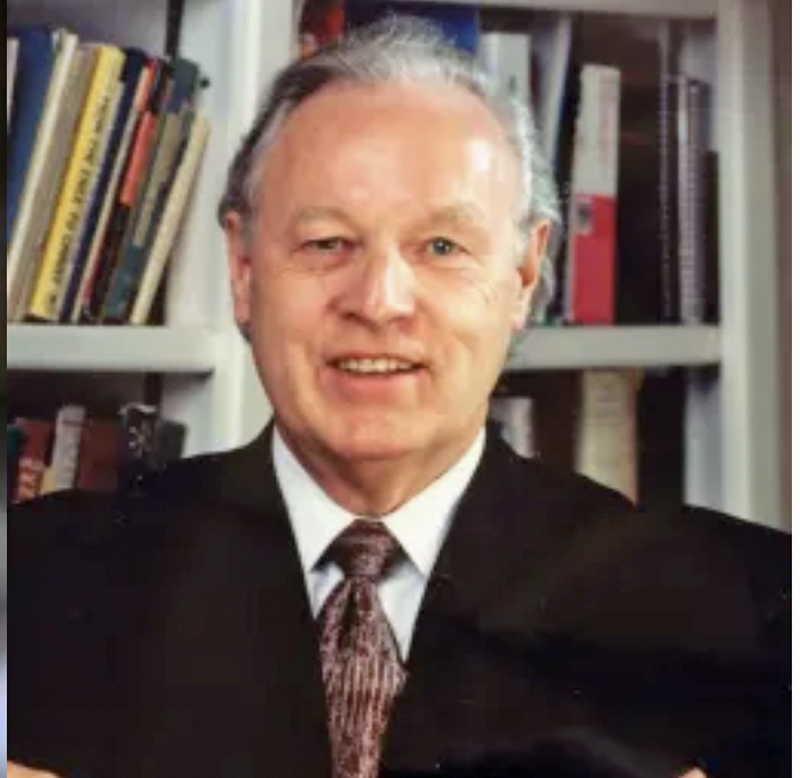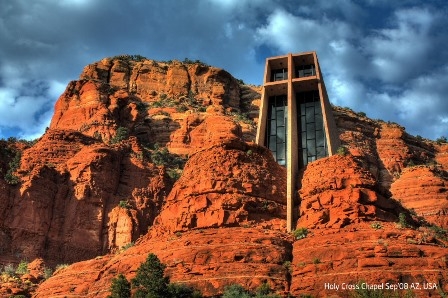
By Brian Nixon, Special to ASSIST News Service
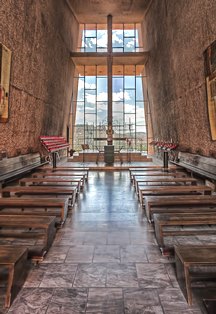 SEDONA, ARIZONA (ANS — February 18, 2018) — Prior to attending a conference in Prescott, Arizona, my wife and I made the one-hour trek north to Sedona to see the famous Chapel of the Holy Cross. As a couple, we’ve scoured the west for unique places of worship. I suppose one could say we’re church junkies. And though small in stature, the Chapel of the Holy Cross did not disappoint.
SEDONA, ARIZONA (ANS — February 18, 2018) — Prior to attending a conference in Prescott, Arizona, my wife and I made the one-hour trek north to Sedona to see the famous Chapel of the Holy Cross. As a couple, we’ve scoured the west for unique places of worship. I suppose one could say we’re church junkies. And though small in stature, the Chapel of the Holy Cross did not disappoint.
Designed by sculptor Margerite Staude with the assistance from Lloyd Wright, the Chapel is considered one of the “World’s 50 Most Unusual Churches” by the Huffington Post and one of the “50 Most Extraordinary Churches of the World” by an assortment of online sites [2]. The Huffington Post said these churches “are works of art as well as places of worship” [3]. I couldn’t agree more: the Chapel is art, architecture, and a place of adoration—all in one.
With help from Senator Barry Goldwater, Staude was able to acquire a special-use permit for construction of the Chapel in the Coconino National Forest atop red rocks overlooking a valley. The Chapel was completed in 1956, becoming one of Arizona’s “Seven Man-made Wonders” [4]. And through Staude’s tireless work, Sedona—and America — is the better for her vision.
As we drove up to the church, the simple beauty of the building struck us: a large front edifice with a cross arose from the rocks, surrounded by red rock, mesas, and cliffs. It was stunning. Atop, a short walkway wound around to the beautiful chapel. And though the chapel was small, it had a meditative quality: candles, pews, and Gregorian chant invited prayer and thought. In short, it was a peaceful place, even with the mass of people coming in and out snapping photos.
I think Sedona’s tourism description of the church depicts both the architecture and experience well [5]:
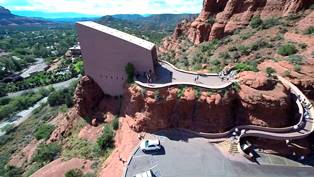 “More than half a century after its construction, the Chapel of the Holy Cross continues to be a place of wonder, spiritual renewal, and sublime vistas for all who come to Sedona.
“More than half a century after its construction, the Chapel of the Holy Cross continues to be a place of wonder, spiritual renewal, and sublime vistas for all who come to Sedona.
“This spiritual citadel on a hill is one of the ‘must see’ sights of Sedona. One of Sedona’s earliest landmarks is also one of its most endearing … where people of all denominations come to offer their prayers, supplications, and praises — and to marvel at the building’s distinctive architecture and the panoramic vistas from its site.
“Even after half a century, the chapel has a contemporary, almost out-of-time look, a sculptural feel, and a surreal effect as it juts out of two red mounds on a spur of rock that is 200 feet above the ground.
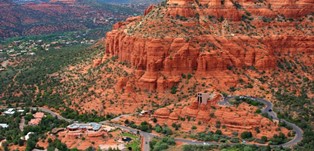 “The chapel’s most prominent feature is a cross that seems to have been wedged into the rock by some devout pilgrim, who later built a chapel around it. It is an unforgettable sight from all angles. Looking at it directly, it seems the rocks parted to embrace the structure. From the side, it looks like it was dropped into place; from above, it resembles a diving board or runway where one might leap towards spirit.
“The chapel’s most prominent feature is a cross that seems to have been wedged into the rock by some devout pilgrim, who later built a chapel around it. It is an unforgettable sight from all angles. Looking at it directly, it seems the rocks parted to embrace the structure. From the side, it looks like it was dropped into place; from above, it resembles a diving board or runway where one might leap towards spirit.
“Inside, the chapel is intimate and unadorned. On the periphery, benches hug the angular walls. In the center, two rows of pews — seven on each side — provide a place to pray or rest. The feeling in the chapel is uplifting. Wherever one sits, the eye is drawn to the cross in the center and to the floor-to-ceiling windows behind it, which provide a magnificent backdrop.
“Apart from two tapestries on the wall, the only color in the chapel are the ruby-red flickering candles, a brilliant display of devotion.”
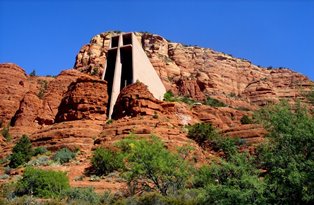 With such praise bestowed upon the Chapel it made me ask: what defines a beautiful building? Is it the architecture? The surroundings? The use of light and art? I suppose all of the above would qualify to make something beautiful. But according to Hugh Bredin and Liberato Santoro-Brienza, “Every architectural work…possesses some symbolic connotation in addition to its functional denotation. One set of connotations derives from the analogy between a building and the human body…” [6].
With such praise bestowed upon the Chapel it made me ask: what defines a beautiful building? Is it the architecture? The surroundings? The use of light and art? I suppose all of the above would qualify to make something beautiful. But according to Hugh Bredin and Liberato Santoro-Brienza, “Every architectural work…possesses some symbolic connotation in addition to its functional denotation. One set of connotations derives from the analogy between a building and the human body…” [6].
If Bredin and Brienza are correct, the Chapel of the Holy Cross represents the human body in a contemplative way, offering itself as a prayer window to the beauty of creation. But seen in light of the Body of Christ, the Chapel of the Holy Cross represents stability among its surroundings. Standing secure on a cliff, the Chapel leads us to look to the “Rock higher than I” (Psalm 61:2), directing our attention towards the Creator, the Architect that inspired the church and crafted the beautiful world upon which it sits.
6. Philosophies of Art and Beauty, page 197.
Photo captions 1) Interior of the Chapel. 2) Aerial view 1. 3) Aerial view 2. 4) Chapel of the Holy Cross. 5) Brian Nixon.
About the writer: Brian Nixon is a writer, artist, musician, and educator. He’s a graduate of California State University, Stanislaus (BA), Veritas Seminary (MA), and is a Fellow at Oxford Graduate School (D.Phil.). To learn more, click here: http://en.wikipedia.org/wiki/Brian_Nixon
** You may republish this or any of our ANS stories with attribution to the ASSIST News Service (www.assistnews.net). Please tell your friends that they can receive a complimentary subscription to our news service by going to the ANS website (see above) and signing up there.





